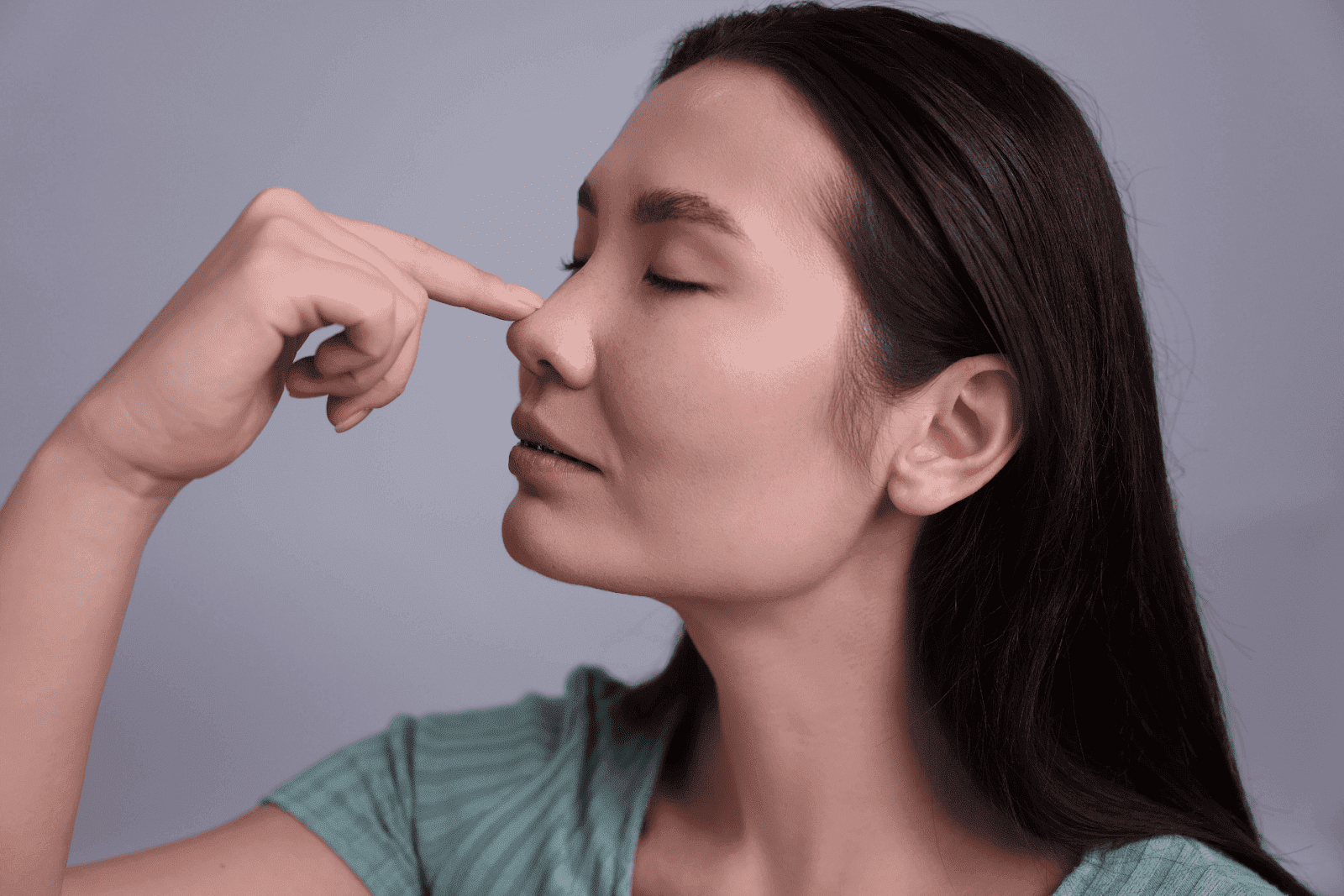Why Is My Nose Twitching?
Nose twitching is a curious and sometimes unsettling sensation that many people experience at some point. Whether it’s a brief spasm or a persistent twitch, the involuntary [...]
Read More
Medically reviewed by Alan Lucks | MD, Alan Lucks MDPC Private Practice - New York on October 14th, 2025.
Myokymia affects the levator labii superioris and other perinasal muscles, causing visible contractions that typically last anywhere from a few seconds to several minutes per episode.
Caffeine intake above 400mg daily (roughly 4 cups of coffee) significantly increases muscle excitability, while magnesium deficiency can trigger fasciculations within 24-48 hours of inadequate intake.
Dehydration reduces electrolyte balance, particularly sodium and potassium levels, causing muscle cells to fire spontaneously—drinking 8-10 glasses of water daily often resolves symptoms within 2-3 days.
Sleep deprivation for more than 24 hours disrupts neurotransmitter regulation, making facial muscles 3x more likely to develop involuntary spasms according to neurological studies.
Persistent twitching beyond 3 weeks, especially when accompanied by facial drooping or numbness, may indicate Bell's palsy, hemifacial spasm, or rarely, multiple sclerosis requiring neurological evaluation.
Nose twitching is a curious and sometimes unsettling sensation that many people experience at some point. Whether it’s a brief spasm or a persistent twitch, the involuntary movement of the nose muscles can leave you wondering what’s causing it and whether it’s something to worry about. This article explores the common reasons behind nose twitching, when it might signal a deeper health issue, and what you can do to address it.
Nose twitching, medically known as myokymia, occurs when the small muscles around the nose contract involuntarily. These muscle spasms are usually harmless and temporary, but they can feel strange or annoying. The twitching might feel like a fluttering or a repetitive movement that you can’t control.
Muscle twitching anywhere on the face, including the nose, is often caused by minor irritation or fatigue of the muscle or the nerves controlling it. Since the muscles around the nose are delicate and connected to facial nerves, even slight triggers can cause noticeable twitches. This phenomenon can be particularly perplexing, as it often strikes without warning and can vary in intensity, sometimes creating a sensation that draws attention to the face.
Interestingly, the twitching may also be influenced by emotional states. For instance, during moments of anxiety or excitement, the body can enter a heightened state of arousal, which may lead to involuntary muscle contractions. This connection between emotional well-being and physical manifestations, such as nose twitching, highlights the intricate relationship between our mental state and bodily functions.
 Common Triggers of Nose Twitching
Common Triggers of Nose TwitchingSeveral everyday factors can lead to nose twitching. These include:
Fatigue and Stress: Lack of sleep or high stress levels can overstimulate nerves and muscles, leading to twitching.
Caffeine and Stimulants: Excessive consumption of caffeine or other stimulants can increase muscle excitability.
Eye Strain: Prolonged screen time or eye fatigue can cause twitching in nearby facial muscles, including those around the nose.
Dehydration or Electrolyte Imbalance: Not drinking enough water or having low levels of minerals like magnesium and potassium can cause muscle spasms.
Allergies or Irritants: Nasal irritation from allergies, pollution, or strong smells may trigger muscle spasms.
In most cases, these twitches resolve on their own once the underlying cause is addressed. For example, reducing caffeine intake, managing stress, or getting adequate rest often stops the twitching. However, if the twitching persists or is accompanied by other symptoms, it may be wise to consult a healthcare professional. Persistent muscle spasms can sometimes indicate underlying neurological conditions or other health issues that may require further evaluation.
Moreover, keeping a journal to track the frequency and circumstances surrounding the twitching can be beneficial. Noting when the twitching occurs, along with any lifestyle factors such as diet, sleep patterns, and stress levels, can help identify potential triggers. This proactive approach can empower individuals to take control of their health and make informed decisions about their well-being.
While nose twitching is usually benign, there are instances when it could indicate a more serious condition. Persistent or severe twitching, especially if accompanied by other symptoms, warrants medical attention.
Consider consulting a healthcare professional if your nose twitching is:
Persistent: Lasting more than a few weeks without improvement.
Accompanied by Other Symptoms: Such as facial weakness, drooping, numbness, or pain.
Spreading: Twitching that moves to other parts of the face or body.
Severe or Disruptive: Interfering with daily activities or sleep.
These signs could indicate neurological conditions such as hemifacial spasm, Bell’s palsy, or even rarer disorders affecting the facial nerves. Early diagnosis and treatment are important for these conditions.
If you’re experiencing concerning symptoms or just want reassurance about your nose twitching, telehealth services offer a convenient way to consult with medical experts. Doctronic.ai provides access to qualified doctors 24/7 from the comfort of your home. You can get a thorough evaluation, personalized advice, and treatment recommendations without waiting weeks for an appointment.
Doctronic’s AI-powered system combines the latest medical research with personalized care, offering fast and reliable answers to your health questions. Whether you just want to understand your symptoms or need a telehealth video visit with a licensed physician, Doctronic makes quality care accessible and affordable.
Beyond the common triggers and neurological concerns, there are additional factors that may cause nose twitching. Understanding these can help you identify the root cause more effectively.
Some medications, especially those affecting the nervous system, can cause muscle twitching as a side effect. Stimulants, corticosteroids, or certain antidepressants may lead to increased muscle excitability. If you recently started a new medication and notice twitching, discuss it with your healthcare provider.
Deficiencies in vitamins such as B12 or minerals like magnesium can affect nerve and muscle function. Ensuring a balanced diet or taking supplements as advised by a doctor can help reduce twitching episodes.
Injury or inflammation of the facial nerves, whether from trauma, infection, or surgery, can cause twitching. If you have a history of facial trauma or recent dental procedures, this could be a contributing factor.
Sometimes, anxiety or heightened awareness of bodily sensations can make minor twitches feel more pronounced. Relaxation techniques and stress management can be helpful in these cases.
Most nose twitches are manageable with simple lifestyle adjustments and self-care. Here are some practical steps to help reduce or prevent twitching:
Getting enough sleep and finding ways to manage stress, such as meditation, exercise, or hobbies, can significantly reduce muscle twitching caused by fatigue and tension.
Limit coffee, energy drinks, and other sources of caffeine, especially if you notice twitching after consumption. Switching to decaffeinated beverages or herbal teas may help.
Drink plenty of water throughout the day and eat a diet rich in fruits, vegetables, and whole grains. If you suspect nutritional deficiencies, consult a healthcare provider for testing and guidance.
Reduce eye strain by following the 20-20-20 rule: every 20 minutes, look at something 20 feet away for at least 20 seconds. This can help relax facial muscles and reduce twitching.
If twitching persists or worsens, don’t hesitate to get a professional evaluation. Using telehealth services like Doctronic.ai allows you to quickly connect with doctors who can provide personalized care and peace of mind.
Telehealth has transformed access to medical care, making it easier than ever to get expert advice without leaving home. This is especially valuable for symptoms like nose twitching, where timely assessment can prevent unnecessary anxiety and ensure proper treatment if needed.
Doctronic.ai stands out as a leader in AI-powered telehealth. Their platform offers free AI doctor visits that provide instant, evidence-based answers to your health questions. If the AI suggests further evaluation, you can book affordable video visits with licensed doctors anytime, anywhere in the United States.
With over 10 million users and counting, Doctronic is revolutionizing how people access primary care. Their AI remembers your medical history and preferences, offering personalized and consistent care that feels truly human. This combination of cutting-edge technology and compassionate service makes Doctronic an excellent choice for managing symptoms like nose twitching.
 Summary
SummaryNose twitching is a common and usually harmless phenomenon caused by muscle spasms around the nose. Common triggers include stress, fatigue, caffeine, dehydration, and eye strain. Most cases resolve with simple lifestyle changes, but persistent or severe twitching accompanied by other symptoms should be evaluated by a healthcare professional.
Telehealth services like Doctronic.ai provide a convenient and affordable way to get expert medical advice and treatment recommendations for nose twitching and other health concerns. By leveraging advanced AI and licensed physicians, Doctronic offers fast, personalized, and comprehensive care that fits into your busy life.
If you’re experiencing nose twitching and want to understand what’s going on or need medical guidance, consider trying Doctronic.ai for an accessible and modern healthcare experience.
If nose twitching is bothering you and you're seeking answers, Doctronic is here to help. As the #1 AI Doctor, we offer free AI doctor visits that provide instant, personalized health insights. Our AI synthesizes the latest peer-reviewed medical research to give you the most modern and accurate advice. Plus, with our telehealth video visits, you can connect with our doctors anytime, anywhere in all 50 states for less than $40. Experience the most personal care with an AI that remembers you and has limitless patience. Skip the line. Talk to an AI Doctor Now, for free.
Most episodes resolve within 1-2 weeks by addressing the underlying trigger—reducing caffeine, improving sleep, and staying hydrated are the most effective interventions. Seek medical attention if symptoms persist beyond 3 weeks or involve facial weakness. If you're experiencing persistent symptoms, Doctronic can help determine when professional evaluation is needed.
Nose twitching is a curious and sometimes unsettling sensation that many people experience at some point. Whether it’s a brief spasm or a persistent twitch, the involuntary [...]
Read More